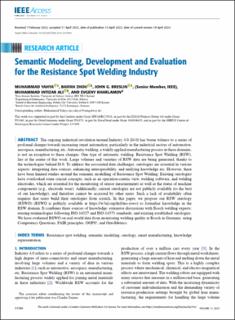| dc.contributor.author | Yahya, Muhammad | |
| dc.contributor.author | Zhou, Baifan | |
| dc.contributor.author | Breslin, John G. | |
| dc.contributor.author | Ali, Muhammad Intizar | |
| dc.contributor.author | Kharlamov, Evgeny | |
| dc.date.accessioned | 2024-01-22T06:43:19Z | |
| dc.date.available | 2024-01-22T06:43:19Z | |
| dc.date.created | 2023-06-26T13:52:26Z | |
| dc.date.issued | 2023 | |
| dc.identifier.citation | IEEE Access. 2023, 11 37360-37377. | en_US |
| dc.identifier.issn | 2169-3536 | |
| dc.identifier.uri | https://hdl.handle.net/11250/3112910 | |
| dc.description.abstract | The ongoing industrial revolution termed Industry 4.0 (I4.0) has borne witness to a series of profound changes towards increasing smart automation, particularly in the industrial sectors of automotive, aerospace, manufacturing, etc. Automatic welding, a widely applied manufacturing process in these domains, is not an exception to these changes. One type of automatic welding, Resistance Spot Welding (RSW), lies at the center of this work. Large volumes and varieties of RSW data are being generated, thanks to the technologies behind I4.0. To address the associated data challenges, ontologies are essential in various aspects: integrating data sources, enhancing interoperability, and unifying knowledge etc. However, there have been limited studies around the semantic modelling of Resistance Spot Welding: Existing ontologies have overlooked some crucial concepts, such as an operation-centric view, welding software, and welding electrodes, which are essential for the monitoring of sensor measurements as well as the status of machine components (e.g., electrode wear). Additionally, current ontologies are not publicly available (to the best of our knowledge), and therefore cannot be accessed by other users. Such a lack of availability often requires that users build their ontologies from scratch. In this paper, we propose our RSW ontology (RSWO) (RSWO is publicly available at https://w3id.org/def/mo-rswo) to formalize knowledge in the RSW domain. It combines three sources of knowledge: extensive discussions with Bosch welding experts; reusing terminologies following ISO-14327 and ISO-14373 standards; and existing established ontologies. We have evaluated RSWO on real-world data from monitoring welding quality at Bosch in Germany, using Competency Questions, FAIR principles, OOPS!, and OntoMetrics. | en_US |
| dc.language.iso | eng | en_US |
| dc.rights | Navngivelse 4.0 Internasjonal | * |
| dc.rights.uri | http://creativecommons.org/licenses/by/4.0/deed.no | * |
| dc.title | Semantic Modeling, Development and Evaluation for the Resistance Spot Welding Industry | en_US |
| dc.type | Peer reviewed | en_US |
| dc.type | Journal article | en_US |
| dc.description.version | publishedVersion | en_US |
| cristin.ispublished | true | |
| cristin.fulltext | original | |
| cristin.qualitycode | 1 | |
| dc.identifier.doi | 10.1109/ACCESS.2023.3267000 | |
| dc.identifier.cristin | 2158093 | |
| dc.source.journal | IEEE Access | en_US |
| dc.source.volume | 11 | en_US |
| dc.source.pagenumber | 37360-37377 | en_US |
| dc.relation.project | Norges forskningsråd: 237898 | en_US |
| dc.relation.project | Norges forskningsråd: 308817 | en_US |
| dc.relation.project | EU – Horisont Europa (EC/HEU): 101123490 | en_US |
| dc.relation.project | EU – Horisont Europa (EC/HEU): 101138517 | en_US |
| dc.relation.project | EU – Horisont Europa (EC/HEU): 101092008 | en_US |
| dc.relation.project | EU – Horisont Europa (EC/HEU): 101058384 | en_US |

